Related Research Articles

Pramoedya Ananta Toer, also nicknamed Pram, was an Indonesian novelist and writer. His works span the colonial period under Dutch rule, Indonesia's struggle for independence, its occupation by Japan during the Second World War, as well as the post-colonial authoritarian regimes of Sukarno and Suharto, and are infused with personal and national history.

Abdul Muis, was an Indonesian writer, journalist and nationalist. He advocated for Indonesia's independence from the Netherlands. He was the first person to be named a national hero by President Sukarno.

Indonesian literature is a term grouping various genres of South-East Asian literature.

30 Hari Mencari Cinta is a 2004 Indonesian romantic comedy film drama directed by Upi Avianto and starring Maria Agnes. Music for the film was composed by Andi Rianto.
Upi Avianto is an Indonesian screenwriter and film director who has worked on several of Indonesia's most popular films in the 2000s.
Abu Ali al-Hassan ibn Masud al-Yusi (1631–1691) was a Moroccan Sufi writer. He is considered to be the greatest Moroccan scholar of the seventeenth century and was a close associate of the first Alaouite sultan Rashid. Al-Yusi was born in a Berber tribe, the Ait Yusi, just north of Fes. He was married to Zahra bint Muhammad b. Musa al-Fasi. Al-Yusi left his native village on a very young age for a lifelong pilgrimage. He received his barakah from Sheikh Mohammed Ben Nasir of the tariqa Nasiriyya of Tamegroute, and studied and taught at the zawiyya of Dila with Mohammed al-Hajj ibn Abu Bakr al-Dila'i.
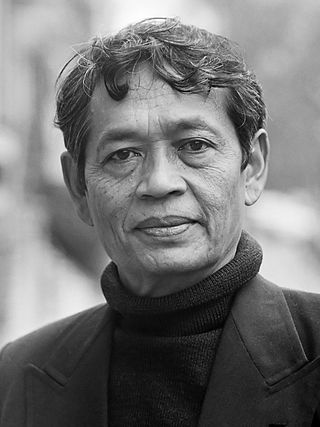
Mochtar Lubis was an Indonesian Batak journalist and novelist who co-founded Indonesia Raya and monthly literary magazine "Horison". His novel Senja di Jakarta was the first Indonesian novel to be translated into English. He was a critic of Sukarno and was imprisoned by him.

Laksmi Pamuntjak is an Indonesian novelist, poet, journalist and food critic based in Jakarta. In 2016, she won the LiBeraturpreis for the German translation of her debut novel, Amba/The Question of Red. In 2018, the movie adaptation of her second novel, Aruna dan Lidahnya, won two prizes at the Festival Film Indonesia. In 2020, her third novel, Fall Baby, won the Singapore Book Award for Best Literary Work. She also writes widely on culture and politics including for the Jakarta Post and the Indonesian newsmagazine Tempo, as well as international publications such as South China Morning Post and the Guardian.
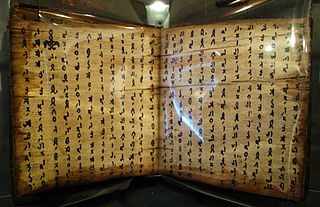
Mandailing or Mandailing Batak is an Austronesian language spoken in Indonesia, the northern island of Sumatra. It is spoken mainly in Mandailing Natal Regency, North Padang Lawas Regency, Padang Lawas Regency, and eastern parts of Labuhan Batu Regency, North Labuhan Batu Regency, South Labuhan Batu Regency and northwestern parts of Riau Province. It is written using the Latin script but historically used Batak script.

Achdiat Karta Mihardja was an Indonesian author, novelist and playwright. He is best known for his novel, Atheis, which was published in 1949. Atheis is considered one of Indonesia's most important literary works following World War II.

Samudra Raksa Museum is a maritime museum that was built several hundred meters north of the 8th-century Borobudur Buddhist monument, within the Borobudur archaeological complex, Magelang, Central Java, Indonesia. The museum features and interprets the ancient maritime Indian Ocean trade among between ancient Indonesia, Madagascar, and East Africa, popularly dubbed as "the cinnamon route". The centerpiece of museum is the full-scale reconstruction of the 8th-century Borobudur ship. It was used in a successful expedition from Indonesia to Madagascar and Ghana in 2003—2004. The Borobudur Ship — a 25 meter-long wooden ship modeled after wall reliefs found on the 8th century Borobudur temple in Central Java.

Belenggoe is a novel by Indonesian author Armijn Pane. The novel follows the love triangle between a doctor, his wife, and his childhood friend, which eventually causes each of the three characters to lose the ones they love. Originally published by the literary magazine Poedjangga Baroe in three instalments from April to June 1940, it was the magazine's only published novel. It was also the first Indonesian psychological novel.

Atheis is a 1949 Indonesian novel written by Achdiat Karta Mihardja and published by Balai Pustaka. The novel, using three narrative voices, details the rise and fall of Hasan, a young Muslim who is raised to be religious but winds up doubting his faith after dealings with his Marxist–Leninist childhood friend and an anarcho-nihilist writer.
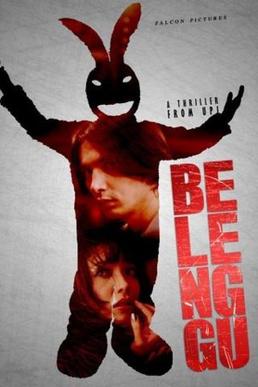
Shackled is a 2012 Indonesian horror film directed by Upi Avianto. The film is set in Jakarta and involves Elang who has nightmares about an unknown woman in a car with a man in a rabbit suit and dead bodies in the back. Elang later sees this woman in a bar and explains that she's been evicted from her apartment. Elang's nightmares grow worse after he is told by the woman that men had raped and tortured her. Elang agrees to accompany her to face them.
Abul-Abbas Ahmad ibn Ali al-Mandjur al-Miknasi al-Fasi was a Moroccan scholar of theology and law and a prominent teacher at the Qarawiyyin University. He is known to have educated qadis for several Moroccan towns. Between 1579 and 1585 he spent much time in Marrakesh, where he taught the Moroccan sultan Ahmad al-Mansur. He is the author of theological commentaries and especially his fahrasa is of great renown. He was the father of the well-known writer Ahmad Ibn al-Qadi.
Abu Abdallah Mohammed al-Hajj ibn Mohammed ibn Mohammed ibn Abd-al-Rahman ibn Abu Bakr al-Dilai, also known as Al-Murabit, was a renowned linguist and scholar of Arabic grammar and usul-al-fiqh (law). He was the grandson of the founder of the zaouia of Dila, Abu Bakr ibn Mohammed al-Majati as-Sanhaji (1526-1612) and brother of Mohammed al-Hajj, who proclaimed himself Sultan of Fez in 1659. Al-Dila'i wrote (a.o.) treatises on law, poems in praise of the Prophet Mohammed. And an urdjuza about the Shurafa, Durrat al-tidjan. Al-Dila'i performed the Hajj, along with his father, in 1659 and wrote his Rihla in the form of a poem of 136 lines, entitled Al-Rihla al-Mujaddasa. He was the teacher of Abu Ali al-Hassan al-Yusi (1631–1691).
Qumi-Qumi is an animated series created by Toonbox, best known for the Cut the Rope cartoons. From November 2012, it premiered on Multilandia (Multimania) and Carousel. On October 14, 2013, it began broadcasting on the channel STS. The series was developed with the financial support of the Government of Moscow, and since 2011 with the support of Film Foundation. It is based around a small comic book from 2005 that eventually made it into a small music video in 2007, and eventually into a full-fledged cartoon in 2011, Qumi-Qumi tells of three different tribes: the magic-based tribal Jumi-Qumi, the science-based capitalist Yumi-Qumi, and the militaristic and communistic Shumi-Qumi. Three young outcasts of each tribe, Juga, Yusi, and Shumadan, manage to break out of their social norms and become close friends. The speech of the characters is a gibberish language known as Tarabar peppered with Russian phrases. Many plots relate around Juga and Shumadan's crushes on Yusi and trying to interact with their respective tribes despite their own faults.
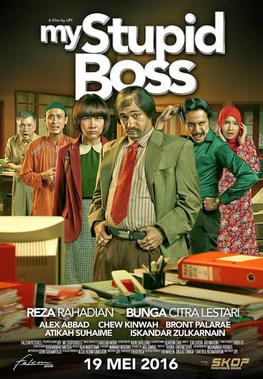
My Stupid Boss is a 2016 Indonesian comedy film directed and written by Upi Avianto based on a four-part novel series of the same name by Chaos@Work. The film stars Reza Rahadian, Bunga Citra Lestari, Alex Abbad, Chew Kin Wah, Atikah Suhaime and Bront Palarae as workers of a company led by a stupid and weird boss known simply as "Bossman". The film was released simultaneously in Indonesia, Malaysia, Singapore and Brunei on 19 May 2016 by Falcon Pictures and Metrowealth Movies Production.
Yusi may refer to:
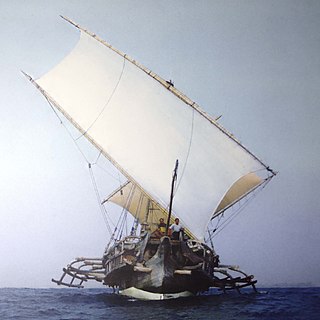
Samudra Raksa is a replica ship built in 2003 based on the relief of ships in the Borobudur temple. In the late 20th century, Philip Beale, a British sailor, became interested in depictions of the ship at Borobudur and decided to reconstruct one. Aided by government and international bodies, he organized an expedition team that constructed the ship and, from 2003 to 2004, sailed it from Indonesia to Madagascar and to Ghana, proving that long-distance trade could have occurred. The Samudra Raksa Museum was constructed at Borobudur Archeological Park to house the ship, opening in 2005, and provides other displays to interpret the ancient maritime history of Indonesians.
References
- ↑ Yusi Avianto Pareanom Writers Directory